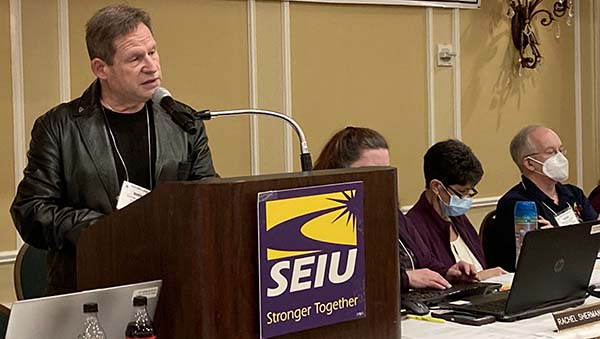
Legislation
|February 22, 2023
Maine’s tax structure remains imbalanced; fix it!
By Dean Staffieri
MSEA-SEIU President
We pay taxes for critical services that benefit all of us. Our public schools and colleges, roads and bridges, public safety, parks, clean water and the safety net protecting our children and seniors are just a few of the services we all count on. The revenues we raise through taxes ideally would provide the conditions for Maine communities to be places where we can all live, work, raise our families and, someday, retire with dignity in our own homes. This would be accomplished by ensuring that those who have benefited the most in this economy make tax contributions toward public investments that pay it forward for future generations of Maine workers, families and retirees.
But the reality is Maine’s current tax structure is imbalanced as a direct result of the 2011 tax cuts that mostly benefited the wealthy. Proposals to further cut taxes would compromise Maine’s capacity to uphold its commitments to Maine people and our communities now and in the future.
Cutting taxes now would create shortfalls in more challenging economic times – which are exactly when resources are needed the most to sustain vital programs for Maine people and communities and to ensure continued investment in our schools and communities.
It’s also important to note those calling for tax cuts now never want to raise them in times of shortfalls to meet the needs of Maine people.
Instead of cutting taxes, the 131st Maine Legislature should keep Maine’s financial house in order both in good times and bad, rather than put a match to it now.
Many of us are still struggling to dig out of the hole after the tax cuts in 2011 and the near destruction of State services. In fact, with the rising cost of living, many are falling further and further behind. Instead of cutting taxes, the members of the 131st Legislature should ensure that profitable corporations and the wealthy pay their share. They should ensure that expensive tax programs like the property tax freeze and others are reigned in and helping those who need it most. More disclosure is long overdue; disclosure would help complete the picture. We look forward to continuing to work with the Legislature and the administration on solutions to address these and other issues.
Tell your story: Understaffing; ending the pay gap; additional funding for Maine Maritime; fully funding a retiree COLA
Our latest edition of our union’s newspaper, Maine Stater, includes resources for all of us to persuade the 131st Legislature and the Mills administration to pass and enact into law a responsible state budget. Read our letter to Governor Janet Mills on Pages 6 and 7. Do your part by testifying in support of a responsible budget. Members Connor Smith, who works for the Maine Department of Administrative and Financial Services, and Gary R. Brooks, who works for the Maine Department of Defense, Veterans and Emergency Management, address understaffing and low wages in their testimony on Page 8. Member Jake Adams calls for more funding for Maine Maritime Academy on Page 12. Retiree Member-Leaders Ginette Rivard, Hal Booth, Steve Butterfield, Penny Whitney-Asdourian and Rob Peale tell their stories on Pages 10 and 11 in support of fully funding a retiree cost-of-living adjustment (COLA).
Read all their stories. Then use our 2023 Guide to Writing Budget Testimony, Sharing Your Story on Page 9 of the Stater to tell your own story to state legislators in support of our issues.
Members speaking out in videos
Our videos in which members address understaffing, the State Employee Pay Gap and the need to fully fund a retiree COLA are getting attention online and helping us build support for our issues at the bargaining table and in the Legislature. Some of the stories on our Facebook page and our YouTube Channel:
- Brian Markey, an assistant technician at Maine DOT. In his former position as a transportation worker, he once plowed continuously for 42-and-a-half hours straight, during the bomb cyclone of February 2017. He said, “You see double-vision, triple-vision, when you get that tired.”
- Brocke Robinson, an emergency communications specialist for the Maine Department of Public Safety. Because of understaffing, “Instead of working eight- or 10-hour shifts, most of the time I’m working 14 or 16 hours, a lot of the times with eight hours off, and then we return to work another 14- or 16-hour shift,” he said. “It can be exhausting….We need to step in now, and get the funding that we need now.”
- Retiree members Bob Ruhlin and Lois Baxter. They talk about how the 2011 pension cuts have put retirees behind the cost of living and the importance of the Legislature addressing this problem.
What’s your story? State legislators need to hear it!